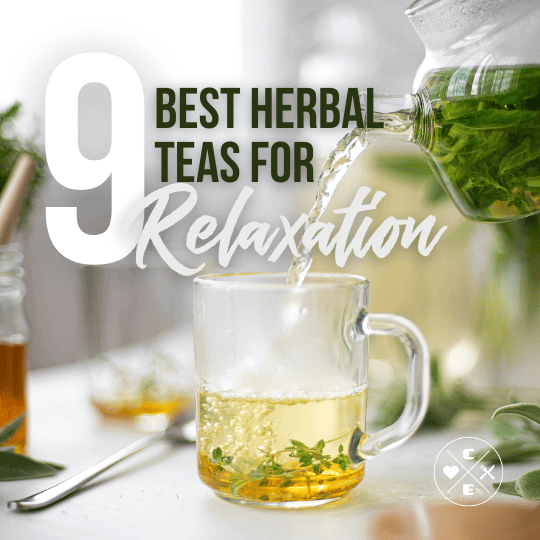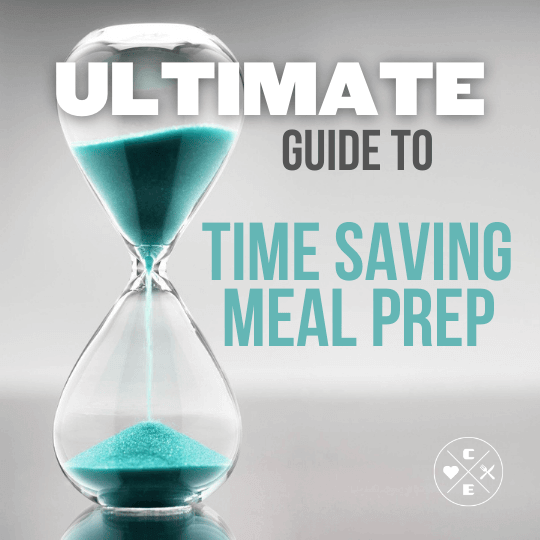
9 Best Herbal Teas for Relaxation
Jason Nista
Healthy Lifestyle
14 minute read
Table of Contents
Looking for a natural way to relax and unwind? Herbal teas are a simple and effective option. Here's a quick rundown of 9 herbal teas known for their calming effects:
- Chamomile Tea: Reduces anxiety, promotes sleep, and soothes digestion.
- Lavender Tea: Eases stress, improves mood, and helps with headaches.
- Peppermint Tea: Relaxes muscles, clears the mind, and aids digestion.
- Lemon Balm Tea: Enhances mood, reduces anxiety, and supports sleep.
- Ashwagandha Tea: Balances stress hormones and improves focus.
- Valerian Root Tea: Promotes deep sleep and calms the nervous system.
- Tulsi (Holy Basil) Tea: Lowers stress and supports emotional balance.
- Passionflower Tea: Calms a racing mind and encourages restful sleep.
- Ginger Tea: Combines stress relief with anti-inflammatory benefits.
Each tea has unique properties, so you can choose one based on your specific needs - whether it's better sleep, reduced tension, or improved mood. Always consult a healthcare provider if you're on medications or have health conditions. Keep reading to learn how to prepare and enjoy these teas for maximum relaxation.
Best Herbal Teas for Stress Reduction
1. Chamomile Tea
Chamomile tea has been used for centuries as a natural way to ease stress and tension. Modern research highlights its flavonoids and terpenoids, which help increase serotonin levels and reduce inflammation. This makes it a great choice for calming both your mind and body.
You can enjoy chamomile tea hot or iced, perhaps with a touch of honey for sweetness. It's a versatile addition to your day - perfect for unwinding before bed, taking a break during work, or even aiding digestion after a meal.
"Various studies have demonstrated the efficacy of chamomile tea in reducing anxiety and promoting relaxation. Experts recommend chamomile tea as a natural and safe alternative to pharmaceuticals for managing stress and anxiety."
Important: If you’re pregnant, have gallstones, or are allergic to plants in the daisy family, check with your doctor before drinking chamomile tea. Its gentle aroma also doubles as a calming aromatherapy experience.
2. Lavender Tea
Lavender tea contains natural compounds like flavonoids and terpenoids that can help lift your mood by boosting serotonin and endorphins. It offers a gentle calming effect, which can ease anxiety, reduce stress, and even help with headaches and migraines. Its mild sedative properties make it a great option for winding down after a long day.
Studies suggest lavender may work as well as some medications for managing anxiety, making it a natural option worth considering. For the best results, try sipping lavender tea 30-60 minutes before bedtime to enjoy its relaxing effects.
Lavender tea is often blended with herbs like chamomile or passionflower to enhance its soothing qualities. Preparing it is simple: steep dried lavender flowers in hot water for 5-7 minutes. Add a bit of honey for a touch of sweetness that pairs perfectly with its floral flavor.
If you're on medication, check with your healthcare provider, as herbal teas can sometimes interact with prescriptions.
3. Peppermint Tea
Peppermint tea is known for its refreshing and calming qualities. The menthol and menthone in peppermint provide a natural way to relax muscles and improve your mood.
One great thing about peppermint tea is that it's caffeine-free, making it a perfect choice any time of day. You can enjoy its calming effects without worrying about feeling groggy, keeping your mind clear while easing tension.
It also offers an added bonus: aromatherapy. As the tea steeps, the menthol-infused steam can help you unwind and feel less stressed, making it an excellent companion during hectic days.
To prepare, steep the tea for 5–7 minutes in hot water. Start with one cup per day and adjust based on your preference. You can also mix peppermint tea with other herbal options like chamomile, lavender, or lemon balm for an even more soothing experience.
Although peppermint tea is safe for most people, those with acid reflux should be cautious, as it might worsen symptoms. If you're on antacids or other medications, check with your healthcare provider before adding it to your routine.
Choose a high-quality peppermint tea to enjoy its full calming potential.
4. Lemon Balm Tea
Lemon balm tea, made from the leaves of Melissa officinalis, has a light citrusy taste with a hint of natural sweetness. Thanks to rosmarinic acid, it’s known for helping ease anxiety and encouraging relaxation. The best part? It promotes mental clarity and calmness without making you feel sleepy.
To enjoy its benefits, brew it the right way: steep 1–2 teaspoons of dried lemon balm leaves in hot water for 5–7 minutes. This caffeine-free tea is perfect for any time of day, but it’s especially helpful before bed to encourage better sleep.
Benefits of Lemon Balm Tea:
- Helps reduce stress and anxiety
- Supports better sleep
- Aids digestion
- Gentle enough for daily use
However, if you're taking thyroid medications or sedatives, it's a good idea to check with your doctor before adding this tea to your routine. Brands like Traditional Medicinals and Yogi offer blends that maintain the herb’s natural qualities.
If stress is a constant companion, sipping on lemon balm tea in the evening can be a soothing way to wind down and find a sense of calm.
5. Ashwagandha Tea
Ashwagandha tea, made from the plant's roots, is known for helping the body handle stress. It works by managing cortisol, the main stress hormone, offering more than just a calming effect - it helps your body respond better to stress over time.
Here are some ways ashwagandha tea can support your overall wellness:
| Benefit | How It Helps |
|---|---|
| Stress Relief | Helps balance cortisol levels and supports a stable mood |
| Better Sleep | Encourages restful sleep without leaving you feeling groggy |
| Mental Focus | Promotes calmness while supporting cognitive function |
| Physical Health | Offers anti-inflammatory benefits that support the entire body |
For the best results, brew the tea for 5–7 minutes before bedtime. You can add a bit of honey or mix it with rooibos tea to soften its earthy taste.
Note: While ashwagandha tea is safe for most people, it’s not suitable for everyone. If you have a thyroid condition or take certain medications, consult your doctor before adding it to your routine. Ashwagandha can interact with thyroid medications and other prescriptions.
Adding ashwagandha tea to your nightly ritual may help you build a stronger stress response over time. Regular use can lead to more balanced and consistent benefits.
sbb-itb-1989a25
6. Valerian Root Tea
Valerian root tea is well-known for its ability to promote better sleep and reduce anxiety. The key ingredient, valerenic acid, works with the GABA system in your brain to encourage relaxation.
This tea is a natural option for those dealing with sleep problems or stress-related issues:
| Benefit | Effect | Best Time to Drink |
|---|---|---|
| Sleep Aid | Helps you fall asleep faster | 30–60 minutes before bedtime |
| Anxiety Relief | Soothes the nervous system | Evening or during stressful moments |
| Eases Restlessness | Encourages physical relaxation | As needed |
| Stress Management | Supports handling stress | Regularly in the evening |
To prepare, steep the tea for 5–10 minutes. Start with a small amount to see how your body reacts. For a gentler effect, mix it with chamomile or lavender.
Be cautious - valerian may cause drowsiness and could interact with medications like sedatives or antidepressants. If you're on any medication or have health concerns, check with your doctor first.
For best results, make valerian root tea part of your nighttime routine. Brands like Traditional Medicinals and Twinings offer organic options that retain the tea's natural properties. Pair it with other calming teas to create a relaxing evening ritual.
7. Tulsi Tea
Tulsi tea, also known as "Holy Basil" tea, is a popular herbal option for managing stress and improving mood. This traditional Ayurvedic remedy is packed with compounds like eugenol and rosmarinic acid, which can help ease anxiety and support emotional balance.
To prepare, steep 1–2 teaspoons of dried Tulsi leaves in boiling water for 5–7 minutes. This process brings out its spicy, earthy flavor along with its calming properties. Drinking one or two cups daily may help with stress management.
Research published in the Journal of Ayurveda and Integrative Medicine revealed that Tulsi extract significantly lowered cortisol levels in individuals dealing with chronic stress. Its anti-inflammatory effects and mood-balancing properties add to its appeal as a natural stress reliever.
Tips for Best Results:
- Opt for organic Tulsi tea for a purer experience.
- Combine it with chamomile or lavender for an extra soothing effect.
- Make it a part of your daily routine.
- If you have high blood pressure or take medications, check with your doctor first.
Tulsi tea is a versatile option that can be enjoyed at any time of the day.
8. Passionflower Tea
Passionflower tea is a natural way to calm the mind and improve sleep. It contains flavonoids and alkaloids that help regulate neurotransmitters. In fact, a 2019 study showed that passionflower extract significantly eased anxiety compared to a placebo [1].
Benefits of Passionflower Tea:
- Eases anxiety
- Promotes better sleep
- Reduces restlessness
- Encourages relaxation
Making passionflower tea is simple. Steep 1–2 teaspoons of dried passionflower in hot water for 5–10 minutes. It has a mild, earthy taste and pairs well with other herbs for a soothing blend.
For an even more relaxing experience, enjoy passionflower tea alongside deep breathing exercises, meditation, or yoga.
Safety Tips: While passionflower tea is generally safe, it may cause drowsiness or interact with certain medications, like sedatives or blood pressure drugs. Talk to your doctor before trying it if you:
- Take prescription medications
- Have health conditions
- Are pregnant or nursing
- Plan to use it long-term
For the best results, drink a cup about an hour before bed or during stressful times. Start by using it in the evening to see how your body reacts.
9. Ginger Tea
Ginger tea isn't just a digestive helper; it's also a natural way to ease stress thanks to its anti-inflammatory and antioxidant properties. Packed with compounds like gingerol and shogaol, this tea works to calm both your mind and body, making it a great choice for stress relief.
Benefits of Ginger Tea for Relaxation
- Eases inflammation and oxidative stress
- Encourages a sense of calm
- Aids in digestion
- Helps release physical tension
Research in the Journal of Ethnopharmacology highlights ginger's ability to reduce anxiety, making it a powerful option for tackling stress and digestive discomfort at the same time.
How to Make Ginger Tea
Steep 1-2 teaspoons of fresh ginger in hot water for 5-7 minutes. Add a splash of lemon to boost flavor and nutrient absorption, and a touch of honey for sweetness. Enjoy it hot or cold, depending on your mood.
For maximum benefit, drink 1-2 cups daily, especially during stressful times or before bed.
Things to Keep in Mind
Ginger tea is generally safe, but it's best to start with a small amount to check your tolerance. In higher doses, it might cause mild stomach upset for some people. If you're on medications - particularly for blood pressure or blood thinning - or have certain health conditions, consult your doctor before making it a daily habit.
With a history spanning over 3,000 years, ginger tea's stress-relief powers are now backed by modern science.
How to Get the Most from Relaxing Teas
To fully enjoy the calming benefits of herbal teas, it's important to focus on how you prepare them, when you drink them, and the environment you create. A well-made cup of tea can set the stage for a truly soothing experience.
Perfect Your Preparation
Start with fresh, boiling water and steep your tea for the right amount of time. The steeping duration varies depending on the herb. For instance, chamomile and valerian root benefit from longer steeping, while more delicate herbs require less time.
| Tea Type | Steeping Time | Tips for Best Results |
|---|---|---|
| Chamomile | 7–10 minutes | Cover the cup to trap the aroma |
| Lavender | 5–7 minutes | Avoid oversteeping to prevent bitterness |
| Valerian Root | 8–10 minutes | Best enjoyed before bedtime |
Timing and Ritual
Once you've mastered the brewing process, consider when and how you enjoy your tea. Many people find sipping tea in the evening helps with better sleep. Establishing a calming ritual can amplify the tea's effects.
Here are a few ideas to create a peaceful tea-drinking moment:
- Find a quiet spot away from distractions like screens.
- Use a favorite cup or teapot to make it feel special.
- Take deep breaths as your tea steeps, soaking in the aroma.
- Sip slowly, savoring the warmth and flavor.
You can also pair your tea time with light stretching or meditation for added relaxation.
Choose Quality Teas
Opt for organic teas from trusted brands. Look for companies that share sourcing details and provide testing certificates to ensure the tea is pure and safe.
Listen to Your Body
Everyone's body reacts differently to herbal teas. Start with one cup to see how you feel, especially with stronger herbs like valerian root or ashwagandha. If you notice anything unusual, stop drinking the tea and consult a healthcare provider. Also, if you're taking any medications, check with your doctor to avoid potential interactions.
Wrap-Up on Herbal Teas for Relaxation
These nine herbal teas offer a variety of relaxation benefits, each with its own unique properties. Chamomile, lavender, and peppermint are great for gentle stress relief, while herbs like ashwagandha and tulsi are better suited for handling everyday stress. Valerian root is ideal for promoting deeper relaxation, especially before bed. Meanwhile, lemon balm can lift your mood, passionflower helps calm a racing mind, and ginger works wonders for easing physical tension.
Since everyone reacts differently to herbs, it’s a good idea to start with lighter options like chamomile or peppermint before trying stronger ones like valerian root. You can also experiment with blends - pairing chamomile with lavender or lemon balm with passionflower can create even more calming effects. To get the most out of these teas, consider making them a part of your daily routine, whether you’re looking to improve sleep, reduce stress, or simply enjoy a moment of calm.
For a holistic approach to relaxation, pair these teas with other healthy habits. For example, Clean Eatz Kitchen offers convenient, ready-made meals that support a balanced lifestyle, making it easier to combine good nutrition with your stress-relief efforts.
FAQs
This FAQ highlights key information about herbal teas that may help calm nerves and ease anxiety.
What tea calms nerves and anxiety?
Herbal teas are known for their calming effects and may help reduce anxiety symptoms. Chamomile stands out due to strong research support - a 2016 study showed that long-term use of chamomile extract significantly alleviated moderate to severe symptoms of generalized anxiety disorder (GAD). Its active compound, apigenin, interacts with GABA receptors in a way similar to certain anti-anxiety medications.
Here are some other helpful options:
- Lavender tea: Promotes relaxation and mild sedation.
- Peppermint tea: Eases tension and provides a calming effect.
- Lemon balm tea: Reduces stress and enhances mood.
- Passionflower tea: Calms the mind and supports better sleep.
For best results, consider these tips:
- Begin with gentle teas like chamomile or peppermint.
- Speak with your doctor before mixing herbal teas with medications.
- If you're pregnant or have high blood pressure, consult your doctor before using chamomile.
- Pair tea drinking with relaxation practices like meditation or deep breathing.
Herbal teas can be a soothing addition to a broader stress management approach.
"While herbal teas can be a helpful tool in managing anxiety, they should be used in conjunction with other treatments such as therapy. Long-term use of certain herbal teas like chamomile has been shown to be effective in reducing anxiety symptoms, but it is important to consult with a healthcare practitioner for personalized advice."
Related Articles
Top 7 Fish-Free Meal Delivery Services
12 minute read
Ultimate Guide to Portion Control Containers
8 minute read
Ultimate Guide to Time-Saving Meal Prep
9 minute read



